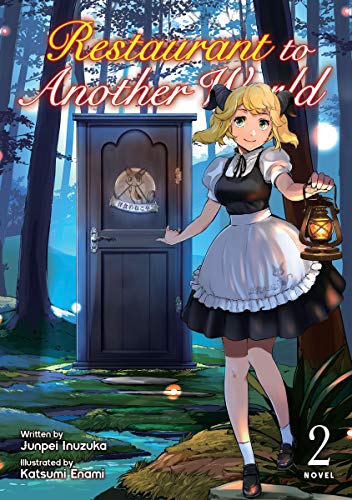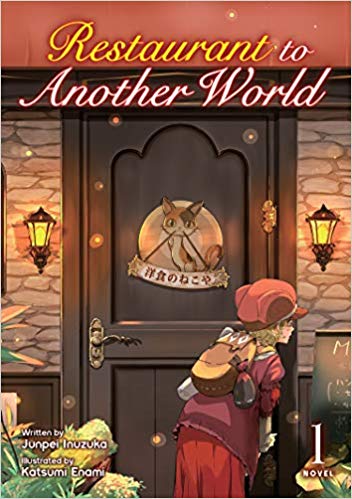By Junpei Inuzuka and Katsumi Enami. Released in Japan as “Isekai Shokudou” by Shufunotomosha. Released in North America by Seven Seas. Translated by Elliot Ryouga. Adapted by Nino Cipri.
I admit that I worried, given the basic content on this series, whether I’d be able to write a full review of any further volumes. It’s not quite true to say there’s still no plot – there is one, barely – or characterization – that’s half the reason to read this – but the reason to get this series is still “I like to read about people eating food and discussing how delicious it is”, and that is what you get. Some of our regulars are back for new chapters, we get some new regulars (though the other waitress from the anime, Kuro, is still absent) and some new dishes. We also hear more about how the food from the Restaurant is beginning to seriously affect the fantasy world it interacts with, as more and more people are not content with waiting seven days but want to try and recreate a bit of what they’ve experienced. The setting may be RPG fantasy, but the food is slowly leveling up.
We do find out a bit more about Aletta, the demon girl who showed up and was hired as a waitress at the end of the first volume. As a waitress, she’s mostly invisible, which is expected given the nature of the chapters – she’s not there to talk about the food, the customers are after she serves them. But we do see some chapters devoted specifically to her – her amazement at the modern-day soap and shampoo that she gets from the still unnamed Master, her reluctance to eat potatoes after having to subsist on only them for so long, and her eventual job as housekeeper for Sarah, the adventurer whose story opened the first book, who doesn’t care that she’s a demon and is happy to have someone take care of things while she’s away. She’s also a good shill for cookies.
Elsewhere, the food company heir brings along his most trusted employee to try to recreate the pizza he’s served by the restaurant; some fairies who are very wary of the door experience some delicious crepes that change their mind (though I disagree with their saying only sweet crepes are good); a demon with the head of a lion tells us about nearly dying in the arena as a gladiator before the restaurant gave him some much needed strength (via katsudon, of course). There’s one chapter that has a predictable but utterly welcome fakeout. In fact, a lot of the series feels like comfort food to me in general. You’re not getting any surprises here – the dwarfs say “By my axe!”, because that’s what fantasy dwarfs do. Likewise, the elves are somewhat prissy, the princesses regal yet cute, etc. The menu doesn’t change, but it’s delicious to read.
The cover of the third volume suggests we’ll meet our new waitress soon, so there may be more plot on the way there. But if it’s descriptions of food and drink you want, both Western *and* Eastern, you acn’t go wrong with this series.



